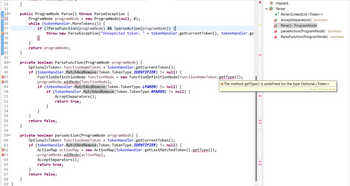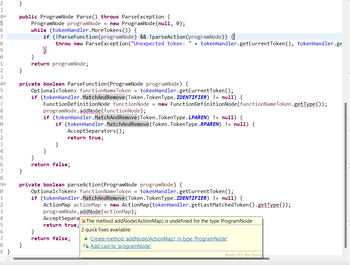
Java Code: Below is Parser.java and there are errors. getType() and getStart() is undefined for the type Optional<Token> and there is an error in addNode(). Make sure to get rid of all the errors in the code. Attached is images of the errors.
Parser.java
import java.text.ParseException;
import java.util.LinkedList;
import java.util.List;
import java.util.Optional;
import javax.swing.ActionMap;
public class Parser {
private TokenHandler tokenHandler;
private LinkedList<Token> tokens;
public Parser(LinkedList<Token> tokens) {
this.tokenHandler = new TokenHandler(tokens);
this.tokens = tokens;
}
public boolean AcceptSeparators() {
boolean foundSeparator = false;
while (tokenHandler.MoreTokens()) {
Optional<Token> currentToken = tokenHandler.getCurrentToken();
if (currentToken.getType() == Token.TokenType.NEWLINE || currentToken.getType() == Token.TokenType.SEMICOLON) {
tokenHandler.consumeMatchedToken();
foundSeparator = true;
} else {
break;
}
}
return foundSeparator;
}
public ProgramNode Parse() throws ParseException {
ProgramNode programNode = new ProgramNode(null, 0);
while (tokenHandler.MoreTokens()) {
if (!ParseFunction(programNode) && !parseAction(programNode)) {
throw new ParseException("Unexpected token: " + tokenHandler.getCurrentToken(), tokenHandler.getCurrentToken().getStart());
}
}
return programNode;
}
private boolean ParseFunction(ProgramNode programNode) {
Optional<Token> functionNameToken = tokenHandler.getCurrentToken();
if (tokenHandler.MatchAndRemove(Token.TokenType.IDENTIFIER) != null) {
FunctionDefinitionNode functionNode = new FunctionDefinitionNode(functionNameToken.getType());
programNode.addNode(functionNode);
if (tokenHandler.MatchAndRemove(Token.TokenType.LPAREN) != null) {
if (tokenHandler.MatchAndRemove(Token.TokenType.RPAREN) != null) {
AcceptSeparators();
return true;
}
}
}
return false;
}
private boolean parseAction(ProgramNode programNode) {
Optional<Token> functionNameToken = tokenHandler.getCurrentToken();
if (tokenHandler.MatchAndRemove(Token.TokenType.IDENTIFIER) != null) {
ActionMap actionMap = new ActionMap(tokenHandler.getLastMatchedToken().getType());
programNode.addNode(actionMap);
AcceptSeparators();
return true;
}
return false;
}
}


It seems there are some issues in your code, including the undefined getType() and getStart() methods for Optional<Token>. The errors you are encountering are because you are trying to access methods on an Optional<Token> object directly. You should first check if the Optional contains a value using .isPresent() and then retrieve the value using .get() before calling any methods on it
I've updated the code to check for the presence of the Optional<Token> using isPresent() and use .get() and .map() to access the TokenType and Start properties when necessary. Make sure that the Token class has appropriate getType() and getStart() methods defined for this code to work correctly.
Step by stepSolved in 3 steps

- Consider an ADT list of integers. In JAVA, write a method that computes the maximum of integers in the list aList. The definition of your method should be independent of the list's implementation. Implement a method swap but remove the assumption that the ith and jth items in the list exist. Throw an exception ListIndexOutOfBoundsException if i or j is out of range.arrow_forwardimport java.util.HashSet; import java.util.Set; // Define a class named LinearSearchSet public class LinearSearchSet { // Define a method named linearSearch that takes in a Set and an integer target // as parameters public static boolean linearSearch(Set<Integer> set, int target) { // Iterate over all elements in the Set for () { // Check if the current value is equal to the target if () { // If so, return true } } // If the target was not found, return false } // Define the main method public static void main(String[] args) { // Create a HashSet of integers and populate integer values Set<Integer> numbers = new HashSet<>(); // Define the target to search for numbers.add(3); numbers.add(6); numbers.add(2); numbers.add(9); numbers.add(11); // Call the linearSearch method with the set…arrow_forwardThe implementations of the methods addAll, removeAll, retainAll, retainAll, containsAll(), and toArray(T[]) are omitted in the MyList interface. Implement these methods. Use the template at https://liveexample.pearsoncmg.com/test/Exercise24_01_13e.txt to implement these methods this the code i have for the write your own code part import java.util.Iterator; interface MyList<E> extends java.util.Collection<E> { void add(int index, E e); boolean contains(Object e); E get(int index); int indexOf(Object e); int lastIndexOf(E e); E remove(int index); E set(int index, E e); void clear(); boolean isEmpty(); Iterator<E> iterator(); boolean containsAll(java.util.Collection<?> c); boolean addAll(java.util.Collection<? extends E> c); boolean removeAll(java.util.Collection<?> c); boolean retainAll(java.util.Collection<?> c); Object[] toArray(); <T> T[] toArray(T[] a); int size();} and its…arrow_forward
- Write a Java class DemoList, the class has:a private attribute list1 as an ArrayList of Integer.Zero argument constructor that create and initilaise list1 to an empty list.A method fill(), which take no argument and return no values. The method should allow the user to read the list of integers: user should be prompted, to enter a series of integers one at a time, until the user enters 0. Those values are used to fill list1.A method sortList() that return the sorted list1.A method brint(): that print contents of list1.A method maximum() that returns maximum of list1.A method average that returns average of list1.A method median() that return median of lsit1 as follows:If the number of elements are odd then the median is the middle one in the sorted listIf the number of elements is even, the median is the average of the middle two elements. For example: the median of 1, 2, 2, 3, 5 is 2, then middle element. The median of 1, 2, 2, 3, 4, 5, is 2.5 the average of the two middle values 2…arrow_forwardI ran the code and got an error. Please fix the error and provide me the correct code for all parts. Make sure to give the screenshot of the output as well.arrow_forwardIn python. Write a LinkedList class that has recursive implementations of the add and remove methods. It should also have recursive implementations of the contains, insert, and reverse methods. The reverse method should not change the data value each node holds - it must rearrange the order of the nodes in the linked list (by changing the next value each node holds). It should have a recursive method named to_plain_list that takes no parameters (unless they have default arguments) and returns a regular Python list that has the same values (from the data attribute of the Node objects), in the same order, as the current state of the linked list. The head data member of the LinkedList class must be private and have a get method defined (named get_head). It should return the first Node in the list (not the value inside it). As in the iterative LinkedList in the exploration, the data members of the Node class don't have to be private. The reason for that is because Node is a trivial class…arrow_forward
- Without using the java collections interface (i.e. do not import java.util.List, LinkedList, etc. ) Write a java program that inserts a new String element (String newItem) into a linked list before another specified item (String itemToInsertBefore). For example if items "A", "B", "C" and "D" are in a linked list in that order and the below method is called, insertBefore("E", "C"), then "E" would be inserted before "C", making the final list to be "A", "B", "E", "C" and "D" with no nulls or blank elements or any elements missing or anything. It should work for all lenghths of linkedlists of Strings. public Boolean insertBefore(String newItem, String itemToInsertBefore) { // returns true if done successfully, else returns false if itemToInsertBefore cannot be found or some other error }arrow_forwardI don't get the "//To be implemented" comments, what am I supposed to do?Also, are the header files and header files implementation different? Like is the linkedList.h different than the linkedList.h (implementation)?arrow_forwardI ran the code and got an error. I even created a main.java file to run the test cases. Please fix the error and provide me the correct code for all parts. Make sure to give the screenshot of the output as well.arrow_forward
- Given the linked list data structure, implement a sub-class TSortedList that makes sure that elements are inserted and maintained in an ascending order in the list. So, given the input sequence {1,7,3,11,5}, when printing the list after inserting the last element it should print like 1, 3, 5, 7, 11. Note that with inheritance, you have to only care about the insertion situation as deletion should still be handled by the parent class.arrow_forwardGiven main() and an IntNode class, complete the IntList class (a linked list of IntNodes) by writing the insertInDescendingOrder() method to insert new IntNodes into the IntList in descending order. Ex. If the input is: 3 4 2 5 1 6 7 9 8 -1 the output is: 9 8 7 6 5 4 3 2 1 import java.util.Scanner; public class SortedList { public static void main (String[] args) {Scanner scnr = new Scanner(System.in);IntList intList = new IntList();IntNode curNode;int num; num = scnr.nextInt(); while (num != -1) {// Insert into linked list in descending order curNode = new IntNode(num);intList.insertInDescendingOrder(curNode);num = scnr.nextInt();}intList.printIntList();}}arrow_forwardSuppose you have created a new class: SortedLinkedList. This class is derived from LinkedList (single links). You are asked to overload the method Insert. The method Insert will no longer take in a parameter position, this is because now Insert will place the element in the correct position such that the list is always sorted. Write the C++ code for the implementation of that Insert method.arrow_forward
 Database System ConceptsComputer ScienceISBN:9780078022159Author:Abraham Silberschatz Professor, Henry F. Korth, S. SudarshanPublisher:McGraw-Hill Education
Database System ConceptsComputer ScienceISBN:9780078022159Author:Abraham Silberschatz Professor, Henry F. Korth, S. SudarshanPublisher:McGraw-Hill Education Starting Out with Python (4th Edition)Computer ScienceISBN:9780134444321Author:Tony GaddisPublisher:PEARSON
Starting Out with Python (4th Edition)Computer ScienceISBN:9780134444321Author:Tony GaddisPublisher:PEARSON Digital Fundamentals (11th Edition)Computer ScienceISBN:9780132737968Author:Thomas L. FloydPublisher:PEARSON
Digital Fundamentals (11th Edition)Computer ScienceISBN:9780132737968Author:Thomas L. FloydPublisher:PEARSON C How to Program (8th Edition)Computer ScienceISBN:9780133976892Author:Paul J. Deitel, Harvey DeitelPublisher:PEARSON
C How to Program (8th Edition)Computer ScienceISBN:9780133976892Author:Paul J. Deitel, Harvey DeitelPublisher:PEARSON Database Systems: Design, Implementation, & Manag...Computer ScienceISBN:9781337627900Author:Carlos Coronel, Steven MorrisPublisher:Cengage Learning
Database Systems: Design, Implementation, & Manag...Computer ScienceISBN:9781337627900Author:Carlos Coronel, Steven MorrisPublisher:Cengage Learning Programmable Logic ControllersComputer ScienceISBN:9780073373843Author:Frank D. PetruzellaPublisher:McGraw-Hill Education
Programmable Logic ControllersComputer ScienceISBN:9780073373843Author:Frank D. PetruzellaPublisher:McGraw-Hill Education





